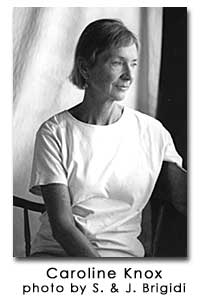 Caroline Knox
Caroline Knox
Working Note
I have been reading from a new series, Bluestocking Feminism, and especially from the work (edited by Rhoda Zuk) of Hester Mulso Chapone, a lesser-known and very fine writer. She wrote essays, letters, and poems, and was a friend of both Samuel Johnson and Samuel Richardson.
Reading along, I collected some of her prose sentences — colloquial, contradictory, sensible, confident, opinionated. To make my poem, I wanted to include these sentences with the quatrain which Dr. Johnson had chosen to illustrate the “Quatrain” entry in the Dictionary. It’s the first stanza of Hester’s “Ode to Stella,” full of logic, poise, music, and good humor. So I forced the sentences into (rather ragged) quatrains. I allowed these two elements to sit together in the poem, hoping to bring to life a version of Hester’s voice on the page. And I loved the sound of the names “Mulso” and “Pufendorf.”
Quatrains by Hester Mulso (1728-1784)
“The old Yahoos were a thousand times
more wicked and unreasonable
than a little Yahoo would be.” “The
Harlowes bade Clarissa be
good and consequently happy.”
“Fathers are taught by Bishop
Hall (I don’t love that Bishop
Hall, why did you quote him?)
to believe their children goods and
chattels.”“A tyrant master to his servant:
‘You thought! how dare you to think? Do I
keep you to think?’” “I am ready
to subscribe to all that Pufendorf
says, with this proviso: that
the filial duty be owing to those
who perform the parental duty.”
“Nothing will induce me to design
an ending for Sir Charles Grandison.”
“You cannot be too conversant with the
Psalms, a continuous feast.” “Avoid
of all things intimacy with those
of low birth and education.” “Affection
is not like a portion of freehold land.”
“In the case of real injuries, express
a noble and generous kind of anger.”
“Youth may pursue wealth with all the
rapacity of an old usurer.” Dr. Johnson
chose a quatrain from Hester’s “Ode to Stella”
to illustrate the entry for “Quatrain”
in A Dictionary of the English Language:
“Say, Stella, what is love, whose fatal pow’r
Robs virtue of content, and youth of joy?
What nymph or goddess in a luckless hour
Disclos’d to light the mischief-making boy?”
Bio: Caroline Knox’s collection A Beaker: New and Selected Poems appeared from Verse Press in May 2002. Her previous books are The House Party and To Newfoundland (Georgia 1984, 1989) and Sleepers Wake (Timken 1994). Her work has appeared in The American Scholar, The American Voice, Harvard, The Massachusetts Review, The Paris Review, Ploughshares, Poetry, and elsewhere.
Knox has received awards from the National Endowment for the Arts, the Ingram Merrill Foundation, the Yale/Mellon Visiting Faculty Program, the Massachusetts Cultural Council, The Fund for Poetry, the Senior Fellowship Program of the Fine Arts Work Center, and from Poetry magazine (the Bess Hokin Prize). Her work has been anthologized in The Best American Poetry 1988 and 1994.